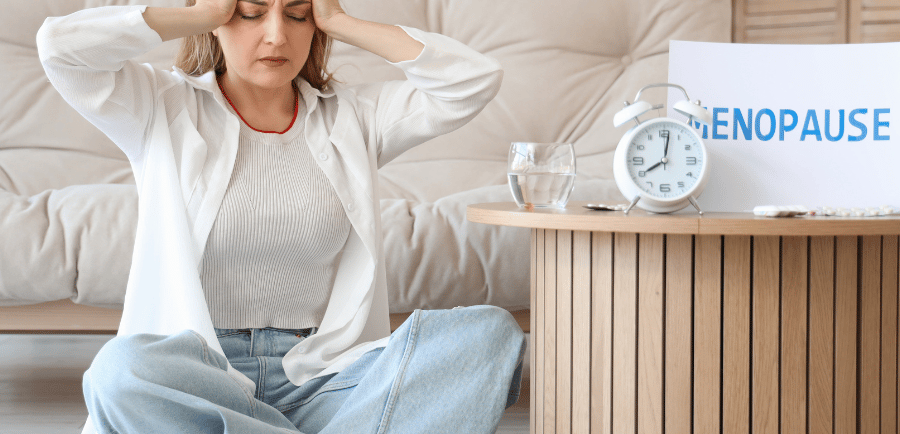Hot Flashes, Mood Swings & More: A Real Talk on Menopause
These are the quintessential menopause symptoms, often referred to as vasomotor symptoms (VMS) when talking about temperature fluctuations.
10/19/20253 min read


Let's face it: The word "menopause" often conjures up images of dramatic hot flashes and unpredictable mood swings. But for the millions of women navigating this natural life transition, it's so much more. It's a seismic shift, a mixed bag of physical and emotional changes that deserve a real, honest conversation.
This isn't just about the absence of a period; it’s about a fluctuation and eventual decline in vital hormones, primarily estrogen, that affects nearly every system in your body. If you’re in your 40s or 50s and feeling like you’re starring in a strange, sweaty, and sometimes tearful movie—you’re likely in perimenopause or full menopause.
Here is a real talk on the most common symptoms and, more importantly, what you can do about them.
The Big Three: Hot Flashes, Night Sweats, and Mood Swings
These are the quintessential menopause symptoms, often referred to as vasomotor symptoms (VMS) when talking about temperature fluctuations.
1. Hot Flashes (and Night Sweats)
A hot flash is more than just feeling warm. It’s a sudden, intense wave of heat that sweeps over your body, often starting in the chest and face, sometimes leaving you drenched in sweat. When they happen at night, they are called night sweats—and they are notorious for destroying a good night's sleep.
Real Talk Tip:
Layer Up: Dress in breathable fabrics like cotton, especially at night.
Cooling Tricks: Keep a fan by your bed, sip ice water, and avoid known triggers like caffeine, alcohol, and spicy foods.
Deep Breathing: Practicing slow, deep abdominal breathing when you feel a flush starting can sometimes help lessen its intensity.
2. Mood Swings and Anxiety
Estrogen plays a key role in regulating neurotransmitters in the brain, including serotonin. As estrogen levels bounce around during perimenopause and then drop, it’s common to experience mood swings, increased irritability, anxiety, and even depressive feelings. You might feel “not quite yourself.”
Real Talk Tip:
Prioritize Sleep: Lack of sleep from night sweats exacerbates mood issues. Addressing the sweats often helps the moods.
Move Your Body: Regular exercise—even just a daily walk—is a powerful mood stabilizer.
Talk Therapy: Cognitive Behavioral Therapy (CBT) has been shown to be effective in managing both hot flashes and low mood during this time.
Beyond the Heat: Other Common Menopause Symptoms
While the "Big Three" get the most press, women often wrestle with other, less-discussed symptoms that significantly impact daily life.
3. The Foggy Brain
If you find yourself walking into a room and forgetting why you’re there, or struggling with word retrieval, you are experiencing what is often called brain fog. This frustrating symptom is incredibly common and is linked to fluctuating hormones.
Real Talk Tip:
Mental Exercise: Keep your brain active with puzzles or learning new skills.
Write It Down: Use lists, planners, and apps to track tasks and appointments—don't rely on memory alone!
4. Sleep Disturbances
Insomnia can be a direct result of night sweats waking you up, or a separate issue related to hormonal changes affecting your sleep architecture.
Real Talk Tip:
Keep a Routine: Go to bed and wake up at the same time, even on weekends.
Limit Blue Light: Power down screens (phone, tablet, TV) an hour before bed.
5. Vaginal Dryness and Painful Sex
A decline in estrogen can cause the tissues of the vagina and urethra to become thinner, drier, and less elastic—a condition known as Genitourinary Syndrome of Menopause (GSM). This can lead to itching, burning, and painful intercourse (dyspareunia).
Real Talk Tip:
Over-the-Counter Help: Use high-quality, long-lasting vaginal moisturizers and lubricants.
Talk to Your Doctor: Low-dose topical (vaginal) estrogen creams, rings, or tablets are highly effective and often have minimal systemic risk.
Seeking Solutions: What Really Helps?
Don't suffer in silence! There are evidence-based ways to manage your symptoms and improve your quality of life.
Hormone Replacement Therapy (HRT): For many women, HRT (or MHT - Menopausal Hormone Therapy) is the most effective treatment for managing the full spectrum of symptoms, especially severe hot flashes and mood issues. Your doctor will discuss your medical history and help you weigh the benefits and risks of this personalized treatment.
Non-Hormonal Prescriptions: Certain low-dose antidepressants, anti-seizure, and blood pressure medications have been shown to help reduce the frequency and severity of hot flashes for those who cannot or choose not to take HRT.
Lifestyle Adjustments & Natural Remedies: Consistent stress management, regular exercise, maintaining a healthy weight, and a balanced diet rich in calcium and Vitamin D are non-negotiable foundations for managing menopause well.
The Takeaway
Menopause is not an illness; it's a transition. It's a challenging, multi-faceted phase, but it's also an opportunity to be an advocate for your own women's health.
The most important step is to talk to a doctor who specializes in menopause (like a Certified Menopause Practitioner). Get a full picture of your symptoms and explore the range of treatments available. You don't have to just "power through" hot flashes, mood swings, and brain fog—real, effective help is out there.

